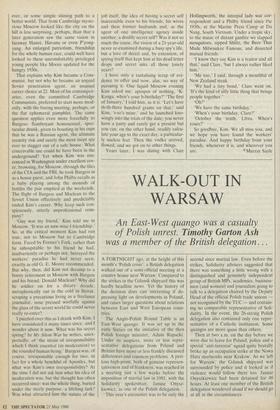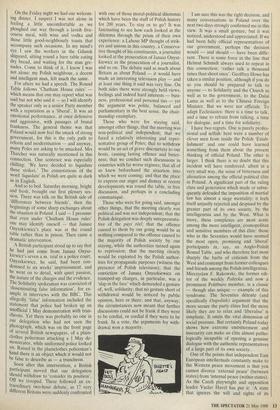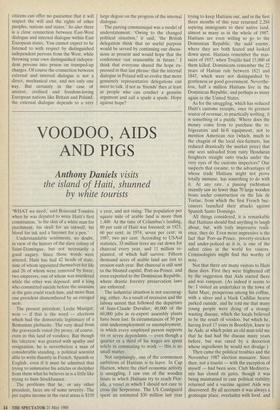WALK-OUT IN WARSAW
An East-West quango was a casualty
of Polish unrest. Timothy Garton Ash
was a member of the British delegation...
A FORTNIGHT ago, at the height of this month's 'Polish crisis', a British delegation walked out of a semi-official meeting at a country house near Warsaw. Compared to the strikes in the Gdansk shipyard this was hardly headline news. Yet the history of the decision does cast interesting if de- pressing light on developments in Poland, and raises larger questions about relations between East and West European coun- tries.
The Anglo-Polish Round Table is an East-West quango. It was set up in the early Sixties on the initiative of the then Polish foreign minister, Adam Rapacki. Under its auspices, more or less repre- sentative delegations from Poland and Britain have more or less frankly discussed differences and common problems. A peri- lous high-point, both of genuine represen- tativeness and of frankness, was reached in a meeting just a few weeks before the imposition of martial law in 1981, with the Solidarity spokesman, Janusz Onysz- kiewicz, as one of the Polish delegation.
This year's encounter was to he only the second since martial law. Even before the strikes, Solidarity advisers suggested that there was something a little wrong with a distinguished and genuinely independent group of British MPs, academics, business- men (and women) and journalists going to talk to a delegation chaired by the Deputy Head of the official Polish trade unions not recognised by the TUC — and contain- ing no comparable representative of Soli- darity. In the event, the 26-strong Polish delegation also contained only one repre- sentative of a Catholic institution. Some quangos are more quasi than others.
Then at two a.m. on the day before we were due to leave for Poland, police and a special 'anti-terrorist' squad quite brutally broke up an occupation strike at the Nowa Huta steelworks near Krakow. As we left for Warsaw, the Gdansk shipyard was surrounded by police and it looked as if violence would follow there too. Janusz Onyszkiewicz had been detained for 48 hours. At least one member of the British delegation wondered aloud if we should go at all in the circumstances.
On the Friday night we had our welcom- ing dinner. I suspect I was not alone in feeling a little uncomfortable as we ploughed our way through a lavish five- course meal, with wine and vodka and those little good-neighbourly toasts that accompany such occasions. In my mind's eye I saw the workers in the Gdansk shipyard, sitting round a bare table eating dry bread, and waiting for the stun gre- nades. Come to think of it, I know I was not alone: my Polish neighbour, a decent and intelligent man, felt much the same.
For afters we had a speech. The Round Table follows 'Chatham House rules' — which means that one may report what was
said but not who said it — so I will identify the speaker only as• a senior Party member
with a reputation as a 'liberal'. It was an emotional performance, at once defensive and aggressive, with passages of brutal frankness. The general theme was that Poland would now feel the smack of strong government, for this is the only path to reform and modernisation — and anyway, many Poles are asking to be smacked. Mrs Thatcher was naturally mentioned in this connection. One sentence was especially chilling: 'We have decided to liquidate these strikes.' The connotations of the word 'liquidate' in Polish are quite as dark as in English. And so to bed. Saturday morning, bright and fresh, brought our first plenary ses- sion. There was talk on the British side of 'differences between friends', then the beginnings of some sharp exchanges about the situation in Poland. I said — I presume that even under 'Chatham House rules' one may identify oneself — that Janusz Onyszkiewicz's place was at the round table rather than in prison. Then came a dramatic intervention.
A British participant stood up to say that he had just come from Janusz Onysz- kiewicz's seven a.m. trial in a police court. Onyszkiewicz, he said, had been con- demned to six weeks' imprisonment, and he went on to detail, with quiet passion, the nature of the charges and the evidence. The Solidarity spokesman was convicted of 'disseminating false information', for ex- ample in interviews with the BBC. This allegedly 'false' information included the statement that police had broken up an unofficial 1 May demonstration with trun- cheons. Yet there was probably no one in our delegation who had not seen the photograph, which was on the front page of several British newspapers, of a plain-
clothes policeman attacking a 1 May de- monstrator, while uniformed police looked on. Raised in the plainclothes policeman's hand there is an object which it would not be false to describe as — a truncheon.
Soon after this intervention, a British participant moved that our delegation should withdraw to 'consider its position'. Off we trooped. There followed an ex- traordinary two-hour debate, as 17 very different Britons were suddenly confronted with one of those moral-political dilemmas which have been the stuff of Polish history for 200 years. To stay or to go? It was fascinating to see how' each looked at the dilemma through the prism of their own experience: a Labour MP thought of strik- ers and unions in this country, a Conserva- tive thought of his constituents, a journalist looked at the prosecution of Janusz Onysz- kiewicz as the prosecution of a journalist, and so on. The debate said as much about Britain as about Poland — it would have made an interesting television play — and at least one thing it said was very fine. On both sides there were strongly held views, feelings and indeed hard interests — busi- ness, professional and personal ties — yet the argument was polite, balanced and parliamentary in the best sense, the chair- manship exemplary.
Those who were for staying said, amongst other things, that the meeting was non-political and independent; that we faced a relatively interesting and repre- sentative group of Poles; that to withdraw would be an act of grave discourtesy to our hosts, causing lasting offence and bitter- ness; that we conduct such discussions in countries with far worse regimes; that all of us knew beforehand the situation into which we were coming; and that the place to express our anger and dismay at recent developments was round the table, in free discussion, and perhaps in a concluding communique.
Those who were for going said, amongst other things, that the meeting clearly was political and was not independent; that the Polish delegation was deeply unrepresenta- tive of the pays reel; that the offence caused to them by our going would be as nothing compared to the offence caused to the majority of Polish society by our staying, while the authorities turned again to repression; that the meeting clearly would be exploited by the Polish author- ities for propaganda purposes (witness the presence of Polish television); that the conviction of Janusz Onyszkiewicz on trumped-up charges, in particular, was a 'slap in the face' which demanded a gesture of, well, solidarity; that no gesture short of withdrawal would be noticed by public opinion, here or there; and that, anyway, the circumstances now meant that further discussions could not be frank if they were to be cordial, or cordial if they were to be frank. In a vote, the arguments for with- drawal won a majority.
I am sure this was the right decision, and many conversations in Poland over the next two days strongly confirmed me in this view. It -was a small gesture, but it was noticed, understood and appreciated. If we had been fully official representatives of our government, perhaps the decision would — and should — have been diffe- rent. There is some force in the line that Helmut Schmidt always used to repeat in this connection: 'rather talk a thousand times than shoot once'. Geoffrey Howe has taken a similar position, although if you do so you should be prepared to talk to anyone — to Solidarity and the Church as well as to the government, to the Dalai Lama as well as to the Chinese Foreign Minister. But we were not officials. To adapt Ecclesiastes: there is a time to talk, and a time to refrain from talking, a time for dialogue, and a time for solidarity.
I have two regrets. One is purely profes- sional and selfish: here were a number of clever men from inside the Polish 'Estab- lishment' and one could have learned something from them about the present thinking of official Poland. The other is larger. I think there is no doubt that this incident will have reinforced, albeit in a very small way, the sense of bitterness and alienation among the official political elite in Poland. A significant part of the ruling class and generation which made or subse- quently defended the imposition of martial law has almost a siege mentality; it feels itself unjustly rejected and despised by the greater part of its own society, by the intelligentsia and by the West. What is more, these complexes are most acute among the more intelligent, cosmopolitan and sensitive members of this elite: those who in the Seventies would have seemed the most open, promising and 'liberal' participants in, say, an Anglo-Polish Round Table, and who therefore feel most sharply the barbs of criticism from the West and contempt from former colleagues and friends among the Polish intelligentsia. Mieczyslaw F. Rakowski, the former edi- tor of the weekly Polity ka and now a prominent Politburo member, is a classic — though also unique — example of this syndrome. The Seventies détente (and specifically Ostpolitik) argument that the more secure the party elites feel the more
likely they are to relax and 'liberalise' is simplistic. It omits the vital dimension of social pressure. But certainly Poland today shows how extreme embitterment and insecurity can make an elite almost patho- logically incapable of opening a genuine dialogue with the authentic representatives of a large part of its own society.
One of the points that independent East European intellectuals constantly make to the Western peace movement is that you cannot divorce 'external peace' (between states) from 'internal peace (within states). As the Czech playwright and opposition leader Vaclav Havel has put it: 'A state that ignores the will and rights of its
citizens can offer no guarantee that it will respect the will and the rights of other peoples, nations and states.' So also there is a close connection between East-West dialogue and internal dialogue within East European states. You cannot expect to be listened to with respect by distinguished independent persons from the West, while throwing your own distinguished indepen- dent persons into prison on trumped-up charges. Of course the connection between external and internal dialogue is not a direct, mechanical one, and not only one way. But certainly in the case of ancient, civilised and freedom-loving European nations like Britain and Poland, the external dialogue depends to a very
large degree on the progress of the internal dialogue.
The parting communique was a model of understatement. 'Owing to the changed political situation,' it said, `the British delegation think that no useful purpose would be served by continuing our discus- sions at present and would hope that the conference can reassemble in future.' I think that everyone shared the hope ex- pressed in that last phrase: that the internal dialogue in Poland will so evolve that more genuinely representative delegations can meet to talk, if not as 'friends' then at least as people who can conduct a genuine argument and call a spade a spade. Hope against hope?
































































 Previous page
Previous page